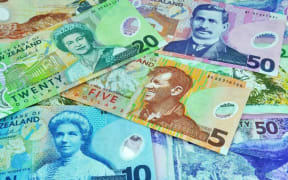Exporters of agricultural products are frustrated with the high New Zealand dollar after it's climb to near parity with the Australian.

New Zealand wine Photo: AFP
That is because it was reducing the value of exports to New Zealand second biggest market. But they did not expect it to change the volume of trade to Australia.
A short time ago the dollar was trading at 99.22 cents Australian.
Australia is the New Zealand wine industry's biggest market. It imported about $350 million of New Zealand wine each year from total exports of $1.4 billion.
But rather than looking for new markets with more favourable exchange rates, the chief executive of New Zealand Winegrowers Philip Gregan said winemakers would stick with Australia.
"Most wine makers are staying put for the ride into Australia. It's a very important market, it's been a very good market for New Zealand wine and New Zealand wine makers over the past decade.
"They're not very happy with the New Zealand dollar against the Australian dollar. That presents New Zealand wine makers with two options, they can either take a reduced margin out of that market or they can try an increase prices.
"But that's not really an option in Australia at the moment given the state of its economy. These are the swings and roundabouts you experience with currencies, and wine makers could be hurting in the short term, but they will try to take a long term view of things," he said.
Australia is also the biggest market for New Zealand avocados, taking 70 percent of total exports of about four and a half million trays this season.
New Zealand Avocado chief executive Jen Scoular said while the high dollar would reduce returns for New Zealand growers it was unlikely to change export volumes.
"It absolutely has impact on the value that's returned out of the Australian market. But Australians do pay between $2.50 and $3 per avocado, so they are generally paying more than New Zealand consumers pay for avocados.
"But if we just look at the season we've just done, there was a 14 percent increast in the consumption of Australian and New Zealand avocados. So we're really seeing an increase in demand across Australia and that's supported by the promotional programme we run in that market."
Overall, Australia buys about 10 percent of New Zealand's horticultural exports, worth about $300 million.
Horticulture New Zealand chief executive Peter Silcock said growers here have little choice but to absorb smaller returns caused by the exchange rate.
"It makes it harder to compete in that market, but generally speaking I think our exporters have been dealing with a rising New Zealand dollar for quite some time. They're probably well placed to manage these things.
"But what we do haver to remember is that our growers have made a long term committment to the crops that they're growing. It's not easy to switch from one market to another or one xcrop to another, it's a long term investment. I don't expect there will be any strong changes in volumes, but people are always looking at where the best opportunities are."
Mr Silcock said the developing economies in Asia were the fasting growing markets for New Zealand's horticultural produce.
'Tough competition'
Federated Farmers said the weaker Australian dollar meant meat and wool exporters faced tougher competition from their Australian rivals in the international market.
President William Rolleston said meat and wool exporters needed to now hold on to markets they broke when the kiwi was lower.
Dr Rolleston said they could do this by creating new products and adding value in terms of safety and quality.



